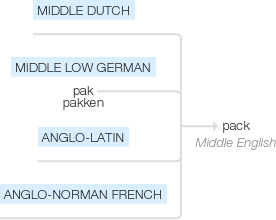Pack
Middle English: from Middle Dutch, Middle Low German pak (noun), pakken (verb). The verb appears early in Anglo-Latin and Anglo-Norman French in connection with the wool trade; trade in English wool was chiefly with the Low Countries.
wiktionary
From Middle English pak, pakke, from Old English pæcca and/or Middle Dutch pak, packe; both ultimately from Proto-Germanic *pakkô(“bundle, pack”). Cognate with Dutch pak(“pack”), Low German Pack(“pack”), German Pack(“pack”), Swedish packe(“pack”), Icelandic pakka, pakki(“package”).
From Middle English pakken, from the noun (see above). Compare Middle Dutch packen(“to pack”), Middle Low German packen(“to pack”).
etymonline
pack (n.)
early 13c., pak, pake, "a bundle or package (of cloth, merchandise, etc.)," also "a bag or purse for carrying things," probably from a Low German word (compare Middle Dutch pac, pack "bundle," Middle Low German pak, Middle Flemish pac, attested from late 12c.) and taken into English from the wool traders in Flanders; or possibly from Old Norse pakki. All are of unknown origin. Italian pacco is a Dutch loan word; French pacque probably is from Flemish.
Especially a bundle enclosed in a wrapping and bound fast with cords. Meaning "set of persons" (usually of a low character) is from late 14c. and is older than sense of "group of instinctively herding hunting animals" (mid-15c.). Extended to "complete set of playing cards" (1590s), floating ice (1791), bundled cigarettes (1865), and submarines (1943).
Meaning "knapsack on a frame" is attested from 1916. Pack of lies is attested from 1763. Meaning "a person of low character" (usually with naughty) is by 1520s.
pack (v.)
late 14c., pakken, "to put together in a pack, bundle (something) up," from pack (n.), possibly influenced by Anglo-French empaker (late 13c.) and Medieval Latin paccare "pack," both of which are from Germanic (compare Middle Dutch packen).
Meaning "pack compactly, cram or crowd together" is from mid-15c. Sense of "to fill (a container) with things arranged more or less methodically" is from late 15c. Meaning "to go away, leave" is from mid-15c. Meaning "to force or press down or together firmly" (of dirt, snow, etc.) is by 1850.
Some senses suggesting "make secret arrangement, manipulate so as to serve one's purposes" are from an Elizabethan mispronunciation of pact, as in pack the cards (1590s) "arrange the deck so as to give one undue advantage." The sense of "to carry or convey in a pack" (1805) led to the general sense of "to carry in any manner;" hence "to be capable of delivering" (a punch, etc.), attested from 1921, and pack heat "carry a gun," 1940s underworld slang. To pack it up "give up, finish" is by 1942. Related: Packed; packing.
